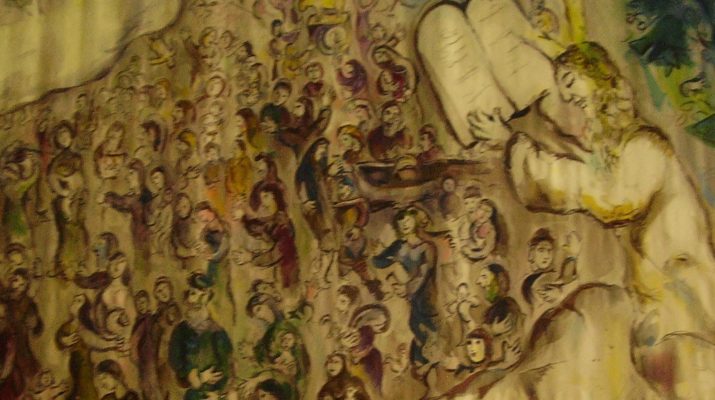Deuteronomy 4:1-2, 6-9
Ordinary B40
1 So now, Israel,A give heedB to the statutesC and ordinancesD that I am teachingE you to observe,F
A “Israel” = Yisrael. From sarah (to persist, exert oneself, contend, persevere, wrestle, prevail) + el (God or god). This is Israel, meaning God strives or one who strives with God; new name for Jacob and for his offspring. This refers to the people and to the land.
B “give heed” = shama. This is to hear, call, consent, or consider. It implies listening intelligently, giving attention, and, because of these two factors, obedience and action are often implied.
C “statutes” = choq. From chaqaq (to inscribe, carve, or decree; a lawmaker; literally, this is engraving, but it implies enacting a law because laws were carved into stone or metal). This is statute, boundary, condition, custom, limit, ordinance It is something that is prescribed or something that is owed.
D “ordinances” = mishpat. From shaphat (to judge, defend, pronounce judgment, condemn, govern). This is a verdict or formal sentence whether from humans or from God. It includes the act of judging as well as the place that judging takes place, the suit itself, and the penalty. Abstractly, this is justice, which includes the rights of the participants.
E “teaching” = lamad. Properly, this refers to goading (using a pointed stick to guide or prod one’s flock). By implication, it means teaching or instructing.
F “observe” = asah. This is to make, do, act, appoint, become in many senses.
so that you may liveG to enterH and occupyI the landJ
G “live” = chayah. This is to live or keep alive in a literal or figurative sense. So, it an be revive, nourish, or save.
H “enter” = bo. This is to enter, come in, advance, fulfill, bring offerings, enter to worship, attack. It can also have a sexual connotation.
I “occupy” = yarash. This is inheriting or dispossessing. It refers to occupying or colonizing – taking territory by driving out the previous inhabitants and living there instead of them. By implication, it can mean to seize or rob, to expel, ruin, or impoverish.
J “land” = erets. Root may mean to be firm. This is earth, ground, field land, or country.
that the Lord,K the GodL of your ancestors,M is givingN you.
K “Lord” = YHVH. From havah (to be, become) or hayah (to come to pass, become, be). This is the name of the God of Israel, the self-existent and eternal one, the tetragrammaton. This pronunciation has been lost to time so “Lord” is generally used in its place.
L “God” = Elohim. Related to “Israel” in v1. See note A above.
M “ancestors” = ab. This is father, chief, or ancestor. It is father in a literal or figurative sense.
N “giving” = natan. This is to give, put, set, offer. It is to give literally or figuratively.
2 You must neither addO anything toP what I commandQ you nor take awayR anything from it,
O “add” = yasaph. This is to add, increase, continue, exceed.
P {untranslated} = dabar. From dabar (to speak, declare, discuss). This is speech, a word, a matter, an affair, charge, command, message, promise, purpose, report, request. It is a word, which implies things that are spoken of in a wide sense.
Q “command” = tsavah. This is to charge, command, order, appoint, or enjoin. This is the root that the Hebrew word for “commandment” comes from (mitsvah).
R “take away” = gara. This is to remove, restrain, cut off, take away, shave, limit.
but keepS the commandmentsT of the Lord your God with which I am chargingU you.
S “keep” = shamar. This is to keep, watch, or preserve. It means to guard something or to protect it as a thorny hedge protects something.
T “commandments” = mitsvah. Related to “command” in v2. From tsavah (see note Q above). This is a commandment, law, ordinance obligation, or tradition. It is something commanded whether by God or by a human authority. This term is sometimes used collectively to refer to the Law.
U “charging” = tsavah. Same as “command” in v2. See note Q above.
6 You must observe them diligently,V for this will show your wisdomW and discernmentX toY the peoples,Z who, when they hearAA all these statutes,
V “observe…diligently” = shamar + asah. Literally “keep and do.” Shamar is the same as “keep” in v2. See note S above. Asah is the same as “observe” in v1. See note F above.
W “wisdom” = chokmah. From chakam (to be wise or teach wisdom; this is wisdom in thought, word, or action). This is wisdom, wit, or skillfulness.
X “discernment” = binah. From bin (to discern, consider, attend to; distinguishing things in one’s mind or, more generally, to understand). This is understanding, wisdom, or discernment.
Y “to” = ayin. Literally “in the sight of.” This is eye in a literal or figurative sense so eye, appearance, favor, or a fountain (the eye of the landscape).
Z “peoples” = am. From amam (to darken, hide, associate; creating shadows by huddling together). This is people or nation. It can be used specifically for a tribe, collectively of troops or armies, or figuratively to refer to a flock of animals.
AA “hear” = shama. Same as “give heed” in v1. See note B above.
will say, “SurelyBB this greatCC nationDD is a wiseEE and discerningFF people!”
BB “surely” = raq. From the same as raq (thin, surely, only); perhaps from raqaq (to spit). This is but, except, at least. In the sense of being thin, it figuratively refers to some kind of limit.
CC “great” = gadol. From gadal (to grow up, become great, become wealthy – to advance. The root meaning may be to twist in the sense of the process of growing). This is great, high, bigger, noble, old, marvelous. It can also refer to someone who is powerful or distinguished.
DD “nation” = goy. From the same root as gevah (the back, person, or body); related to gev (among); related to gaah (to rise up). This is nation or people. Often used to refer to Gentiles or foreign nations. It can also be used figuratively for a group of animals. This is where the Yiddish “goy” comes from.
EE “wise” = chakam. Related to “wisdom” in v6. From chakam (see note W above). This is wise, skillful, cunning, or artful.
FF “is…discerning” = bin. Related to “discernment” in v6. See note X above.
7 For what other great nation has a god so nearGG to it as the Lord our God is whenever we callHH to him? 8 And what other great nation has statutes and ordinances as justII as this entire lawJJ
GG “near” = qarob. From qarab (to come near, offer, make ready). This is near whether nearby, related, near in time, or allied.
HH “call” = qara. This is to call or call out – to call someone by name. Also used more broadly for calling forth.
II “just” = tsaddiq. From the same as tsedeq (rightness, righteousness, just cause, vindication; that which is right in a natural, moral, or legal sense; abstractly equity; figuratively prosperity). This is just, innocent, righteous, righteous one, or lawful.
JJ “law” = torah. From yarah (to throw, shoot, be stunned; to flow as water so figuratively to instruct or teach). This is law, instruction, teaching, or statute. It can also refer to the first five books of the Bible – the Torah.
that I am settingKK beforeLL you today?MM
KK “setting” = natan. Same as “giving” in v1. See note N above.
LL “before” = paneh. From panah (to turn, face, appear). This is face in a literal or figurative sense. It could be face, presence, anger, respect. It can also be used of God to indicate divine favor or presence.
MM “today” = yom. Root may mean being hot. This is the day in a literal or figurative sense. It can also mean birth, age, daylight, continually or other references to time.
9 ButNN take care and watchOO yourselves closely, so as neither to forgetPP the thingsQQ that your eyesRR have seenSS
NN “but” = raq. Same as “surely” in v6. See note BB above.
OO “take care and watch” = shamar + shamar. Same as “observe…diligently” in v2. See note S above.
PP “forget” = shakach. This is to forget because of not remembering something or not paying attention to it. It can also mean to mislay.
QQ “things” = dabar. Same as {untranslated} in v2. See note P above.
RR “eyes” = ayin. Same as “to” in v6. See note Y above.
SS “seen” = raah. This is to see in a literal or figurative sense so stare, advise, think, view.
nor to let them slipTT from your mindUU all the days of your life;VV make them knownWW to your childrenXX and your children’s children—
TT “slip” = sur. This is to turn aside in a literal or figurative sense – to depart, decline, rebel, remove, or withdraw.
UU “mind” = lebab. May be related to labab (to encourage; properly, to be encased as with fat; used in a good sense, this means to transport someone with love; used in a bad sense, it can mean to dull one’s senses). This is the heart, courage, one’s inner self, the mind, or the will. Heart is only used in a figurative sense in the Old and New Testaments.
VV “life” = chay. Related to “live” in v1. From chayah (see note G above). This is alive, living, lifetime. It can also be used to describe someone’s age. It can refer to animals, plants, water, or a company or congregation of people. It is life in a very broad sense.
WW “make…known” = yada. This is to know, acknowledge, advise, answer, be aware, be acquainted with. Properly, this is to figure something out by seeing. It includes ideas of observation, recognition, and care about something. It can be used causatively for instruction, designation, and punishment.
XX “children” = ben. From banah (to build or obtain children). This is son, age, child. It is son in a literal or figurative sense.
Image credit: “The Exodus” by Marc Chagall, Photo by Dr. Avishai Teicher, 2012.




